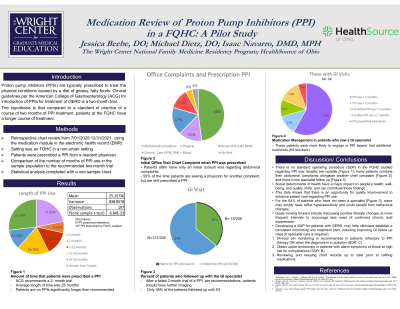Clinical: General Topics
Medication Review of Proton Pump Inhibitors in a Federally Qualified Health Center: A Pilot Study
Friday, March 31, 2023
12:00 PM East Coast USA Time


Jessica Beebe, DO (she/her/hers)
Resident Physician
The Wright Center for Graduate Medical Education
Williamsburg, Ohio, United States
Presenting Author(s)
Background and Hypothesis: The “American Diet” has become characterized by longitudinal and consistent consumption of greasy, fatty foods, resulting in symptoms known as “acid reflux”. Pharmaceuticals such as proton pump inhibitors (PPIs) are typically prescribed to treat some of the physical conditions caused by such a diet, including gastroesophageal reflux disease (GERD). Clinical guidelines per the American College of Gastroenterology for introduction of PPIs for treatment of GERD is a two-month trial, as extended use has a greater risk of complications.
The hypothesis is that compared to a standard of practice of a course of two months of PPI treatment, patients at the FQHC have a longer course of treatment.
Methods: This study was a retrospective chart review from 7/01/2020-12/31/2021. The medication module in the FQHC electronic health record (EMR), which lists the medication name and prescription dates, was reviewed.
The setting of this study was an FQHC in a non-urban setting.
Patients prescribed a PPI from a resident physician during the relevant time frame were included. The exclusion criterion applied were if a patient was deceased, or if a medicine was added to their medication list, but not prescribed by the FQHC resident physician.
A total of 197 patient charts were reviewed.
The outcome measure for this study was a comparison of the number of months of PPI use in the sample population discussed above to the recommended two-month trial.
Results: When the average of 25 months is compared to the recommended period of use of 2 months the p value is highly significant at 6.84x10-23, calculated with a one sample t-test.
Conclusion: This initial data set confirms that in a FQHC, patients are prescribed a longer course of PPIs. There are several medically appropriate conditions requiring long-term PPI use. Future research areas include following specialist visits and concerns discussed at the primary care office to better understand the reason behind our findings.
Independent of why a person would need a PPI, discussing lifestyle modifications is always beneficial. Specifically, within a rural FQHC, there are concerns for food deserts. As a result, poor eating habits and long-term PPI use can become a way of life, putting patients at risk for long-term complications.
An osteopathic approach includes using motivational interviewing skills that draw the patient into taking the steps needed for overall health and well-being, thus creating a comprehensive plan to address body, mind and spirit contributions to the underlying problems that lead to the outcome of GERD.
Acknowledgement of Research Study Sponsors and IRB: This material is based upon work supported by, or in part by, the Wright Center and Healthsource of Ohio.
The Wright Center for Graduate Medical Education Institutional Review Board (WCGME-IRB) has determined this project does not meet the definition of human subject research under the purview of the IRB according to federal regulations.
The hypothesis is that compared to a standard of practice of a course of two months of PPI treatment, patients at the FQHC have a longer course of treatment.
Methods: This study was a retrospective chart review from 7/01/2020-12/31/2021. The medication module in the FQHC electronic health record (EMR), which lists the medication name and prescription dates, was reviewed.
The setting of this study was an FQHC in a non-urban setting.
Patients prescribed a PPI from a resident physician during the relevant time frame were included. The exclusion criterion applied were if a patient was deceased, or if a medicine was added to their medication list, but not prescribed by the FQHC resident physician.
A total of 197 patient charts were reviewed.
The outcome measure for this study was a comparison of the number of months of PPI use in the sample population discussed above to the recommended two-month trial.
Results: When the average of 25 months is compared to the recommended period of use of 2 months the p value is highly significant at 6.84x10-23, calculated with a one sample t-test.
Conclusion: This initial data set confirms that in a FQHC, patients are prescribed a longer course of PPIs. There are several medically appropriate conditions requiring long-term PPI use. Future research areas include following specialist visits and concerns discussed at the primary care office to better understand the reason behind our findings.
Independent of why a person would need a PPI, discussing lifestyle modifications is always beneficial. Specifically, within a rural FQHC, there are concerns for food deserts. As a result, poor eating habits and long-term PPI use can become a way of life, putting patients at risk for long-term complications.
An osteopathic approach includes using motivational interviewing skills that draw the patient into taking the steps needed for overall health and well-being, thus creating a comprehensive plan to address body, mind and spirit contributions to the underlying problems that lead to the outcome of GERD.
Acknowledgement of Research Study Sponsors and IRB: This material is based upon work supported by, or in part by, the Wright Center and Healthsource of Ohio.
The Wright Center for Graduate Medical Education Institutional Review Board (WCGME-IRB) has determined this project does not meet the definition of human subject research under the purview of the IRB according to federal regulations.
